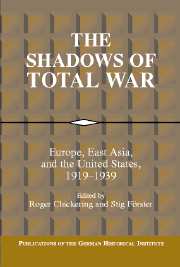Book contents
- Frontmatter
- Introduction
- Part One Reflections on the Interwar Period
- Part Two Legacies of the Great War
- Part Three Visions of the Next War
- Part Four Projections and Practice
- 13 “Not by Law but by Sentiment”: Great Britain and Imperial Defense, 1918-1939
- 14 “Blitzkrieg” or Total War?: War Preparations in Nazi Germany
- 15 The Condor Legion: An Instrument of Total War?
- 16 Stalinism as Total Social War
- 17 Total Colonial Warfare: Ethiopia
- 18 Japan’s Wartime Empire in China
- Index
16 - Stalinism as Total Social War
Published online by Cambridge University Press: 05 January 2013
- Frontmatter
- Introduction
- Part One Reflections on the Interwar Period
- Part Two Legacies of the Great War
- Part Three Visions of the Next War
- Part Four Projections and Practice
- 13 “Not by Law but by Sentiment”: Great Britain and Imperial Defense, 1918-1939
- 14 “Blitzkrieg” or Total War?: War Preparations in Nazi Germany
- 15 The Condor Legion: An Instrument of Total War?
- 16 Stalinism as Total Social War
- 17 Total Colonial Warfare: Ethiopia
- 18 Japan’s Wartime Empire in China
- Index
Summary
In the 1920s and 1930s the Communist Party of the Soviet Union (CPSU) waged a total war against those whom it defined as the exploiting classes. In theory, this war was directed against a social institution - private ownership of the means of production - not against people. In practice, however, it was often waged against persons who were identified simply as members of the propertied classes. Underlying the whole campaign was the premise that changes in material life would in the long run change consciousness, and therefore that people of the propertied classes would eventually acquire, presumably through physical labor, the appropriate worldview. In this chapter, I explore this proposition in the context of collectivization and the campaign against the kulachestvo (well-to-do peasantry). I then offer some thoughts about the resonance in Nazi Germany of the Bolsheviks' war on the kulaks.
Whereas the Bolsheviks in 1917 had hoped to create a world in which there were no standing armies, the possibility of war figured prominently in Soviet domestic politics from the start. The Bolsheviks undertook a class war almost immediately, and Allied intervention in the Russian Civil War only intensified its effects. On May 22, 1918, the Central Committee of the Russian Communist Party observed that “the war to achieve the full power of the proletariat and the poorest sections of peasantry is not even finished in our country,” but already “the imperialists of all countries are filled with hatred. From West and East the beasts of prey are preparing to fall on us.”
- Type
- Chapter
- Information
- The Shadows of Total WarEurope, East Asia, and the United States, 1919–1939, pp. 295 - 312Publisher: Cambridge University PressPrint publication year: 2003

